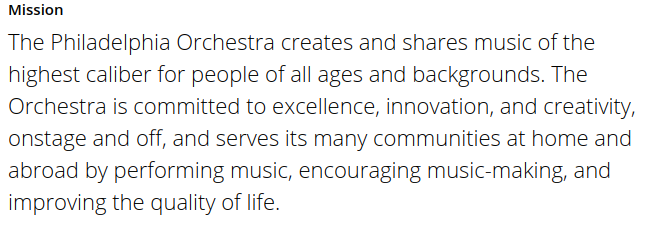Cultural Sector: Give people what they want, even if it is terrible
This post is a part of the Philadelphia History Initiative (@phillyhistory). This week our class is considering where we would invest in the cultural sector, what problems we would tackle, and what impact would we hope to have? Other posts in this series include @tmaust and his look at School Transportation.
Who is really at fault?
When looking at the cultural sector it is interesting to see self-blame emerge. To be sure, there are broken features of the cultural sector, just like one might find in any sector of the economy. Yet, to look at the cultural sector and assess what is broken is only part of the problem.
The biggest problem of the cultural sector is the mission of the organizations within. Altruistic missions have little place in a society and culture that is focused first and foremost on economic and individual value.

The Mission Statement of the Philadelphia Orchestra could be the same for any musical ensemble, yet many seem to have more Capitalization
Cultural institutions such as Arte Publico wait to receive grants and funding when they are clearly in the broad national interest. Education, which includes art, is a human right, and should not be dependent on special funding, grants, or relegated to its own sector. Yet this basic human right is not supported be people ever more focused on individual economic gain in the current society and culture of the United States.
What does that mean?
Barring a revolution, the cultural sector will continue to rely on accumulating resources in the process of Capitalization. Most of these resources remain hotly contested due to increased competition in the arts. The cultural sector will not survive this competition, especially with the increased competition of corporate-backed cultural arts, like the Atlanta World of Coke.

Is this really the kind of culture we need? Does it matter?
What does the future look like?
In the film Idiocracy a crisis is created when a product similar to Gatorade is used instead of water in agriculture. While hilarious, their suggestion is unlikely to come true, at least in the immediate future. However, corporate thinking is still powerful and the current generational shift has done little to suggest that cultural institutions or non-cultural institutions, even corporations like Gatorade, will survive the new age of individualism if they cannot tailor themselves to the patterns of consumption on which people base their decisions.

The solutions:
Therefore, cultural institutions must abandon the mission of doing good for society. Cultural institutions must act solely in economic self-interest and change their mission to one of increased Capitalization in which they provide a platform that pleases the consumer. Consumers don't always act in their best interest, but cultural institutions must give the consumer what the consumer wants, if the institution hopes to survive.
The People’s Republic of Steem
One need not look further than the revolution Philadelphia History Initiative @phillyhistory , and #explore1918 where we are challenged to produce work that is not necessarily the most valuable to society, but rather what is most beneficial to economic growth in the Steem market.
As Che Guevara once argued, “...the fault of many of our artists and intellectuals lies in their original sin; they are not true revolutionaries. We can try to graft the elm tree so that it will bear pears, but at the same time we must plant pear trees.”

100% of the SBD rewards from this #explore1918 post will support the Philadelphia History Initiative @phillyhistory. This crypto-experiment conducted by graduate courses at Temple University's Center for Public History and MLA Program, is exploring history and empowering education. Click here to learn more.
A somewhat bleak outlook @hourofhistory! But I can't disagree that many of our arts institutions have taken exactly this message to heart. My only hope is that there is an accompanying pressure to adequately compensate workers who, in many cases, are working for the cultural institution out of a sense of passion, service, or honor. You can't pay rent with passion.
Wouldn't that be great if workers who brought passion, service, and honor received fair compensation rather than a pat on the back for doing good? I trust that many cultural institutions would treat workers better if they had the resources.
Are you calling for a cryptocurrency Five Year Plan? How can we prevent a Steem Holodomor?
As long as we honor the Universal Declaration of Steemian Rights, I think we can avoid disaster @cheider !
I'd be curious to see how you'd re-write or edit current mission statements (like the one of the Philadelphia Orchestra) to "give the consumer what the consumer wants" and better position institutional survival.
Come to think of it, in the spirit of giving people what they want, over the years the Orchestra has occasionally been accused of including too many popular, familiar (and shallow) musical pieces in their concerts at the expense of the esoteric and experimental.